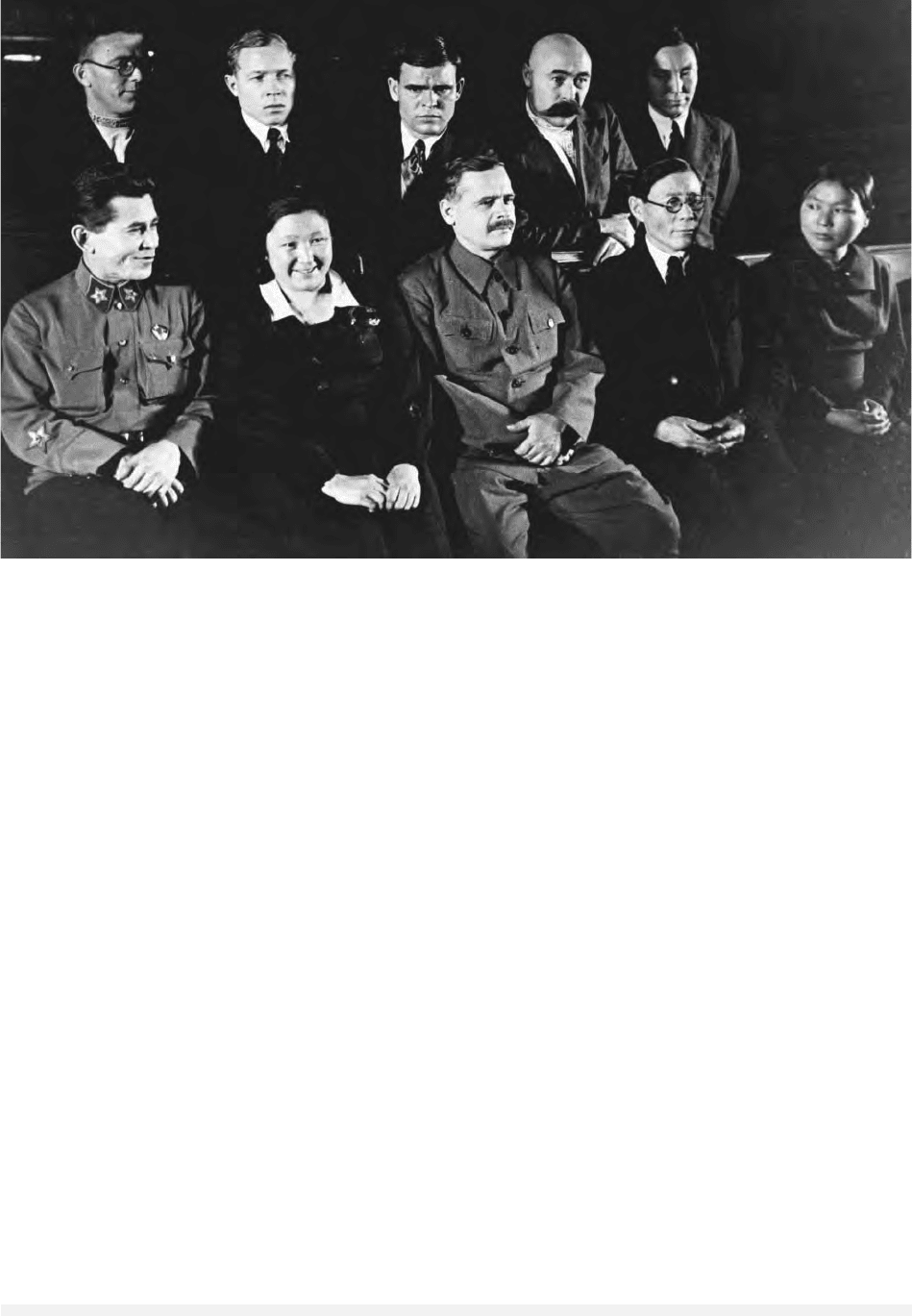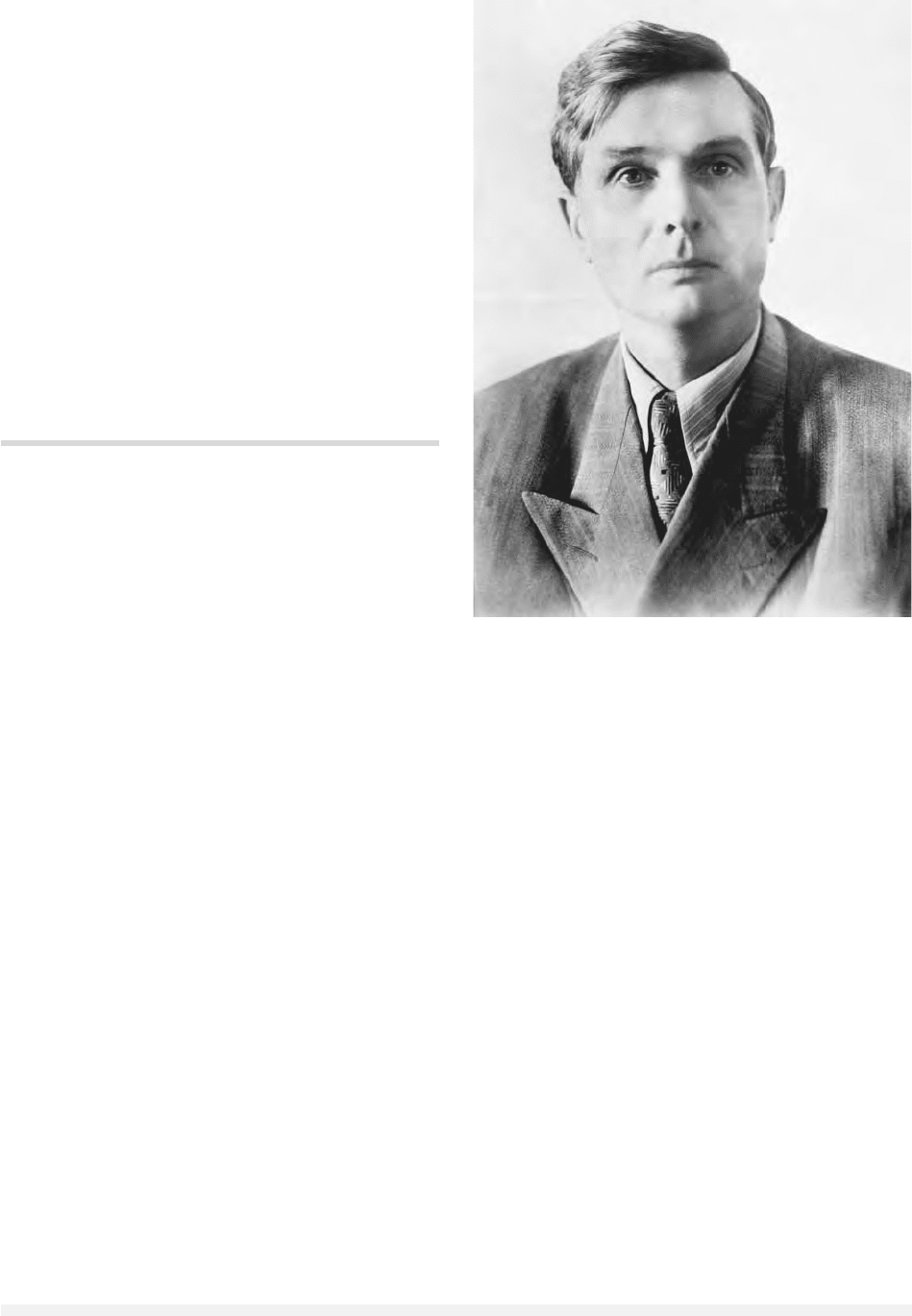Encyclopedia of Russian History
Подождите немного. Документ загружается.


niques to build the metro in the treacherous geol-
ogy of Moscow’s subsoil, which was laced with
underground rivers and quicksand. Builders bored
through layers of Jurassic clay and fissured lime-
stone, soaked with water. Khrushchev recalled that
the builders had only “the vaguest idea of what the
job would entail.” The party mobilized public opin-
ion to gather necessary resources and labor. Days
of voluntary labor became festive occasions as
bands played and able-bodied Muscovites roamed
the shafts looking for work. Prominent officials
picked up shovels and joined Moscow’s masses.
Compared to the construction of the New York
subway system, however, only a handful of Soviet
workers died—and the Soviets trumpeted the suc-
cessful construction as proof of the superiority of
the socialist order. Nonetheless, the Soviets bene-
fited greatly from the long experience of foreign en-
gineers who had helped construct the world’s other
great subway systems. They used the drafts of a
failed 1908 Moscow subway plan, whose backers
were unable to secure financing. Soviet engineers
visited the Berlin subway, studied engineering plans
for the London and Paris subways, and hired Amer-
ican engineers as consultants.
The story of the first Soviet subway was as
much the subject of Soviet propaganda as the ac-
tual metro stations. Soviet memoirs, official histo-
ries, metro architecture, and newspaper accounts
wove the events and personalities of the metro’s
construction into a mythical microcosm of the new
Soviet society. The epic tale of its construction,
which was recounted in two elaborately bound
volumes published in 1935, relayed an ideal con-
ception of socialist engineering and its ability to
conquer and transform nature (human and other-
wise). In this story, successful technological con-
struction did more than fulfill the party plan for
transportation; it proved the inevitable success of
the revolution and the party’s vision of itself as an
instrument of a supposedly scientifically deter-
mined historical destiny.
See also: KAGANOVICH, LAZAR MOYSEYEVICH; KHRUSH-
CHEV, NIKITA SERGEYEVICH; SCIENCE AND TECHNOL-
OGY POLICY
BIBLIOGRAPHY
Bobrick, Benson. (1981). Labyrinths of Iron: A History of
the World’s Subways. New York: Newsweek Books.
Jenks, Andrew. (2000). “A Metro on the Mount: The
Underground as a Church of Soviet Civilization.”
Technology and Culture 41:697-724.
Josephson, Paul. (1995). “‘Projects of the Century’ in So-
viet History: Large-Scale Technologies from Lenin to
Gorbachev.” Technology and Culture 36:519-559.
A
NDREW
J
ENKS
SUCCESSION, LAW ON
Peter I published the Law on Succession, a mani-
festo on the succession to the Russian imperial
throne, on February 16, 1722.
The Law on Succession was the first such writ-
ten law in Russian history. Russia’s rulers in the
fifteenth through seventeenth centuries favored
primogeniture (inheritance by the first-born son),
although this custom could be bypassed for prag-
matic reasons. Peter, prompted by the defection of
his eldest son Alexei (condemned to death for trea-
son in 1718), and by the death of his only surviv-
ing son in 1719, rejected primogeniture and issued
a succession law. The new law required the reign-
ing monarch to nominate his successor with re-
gard to worthiness. It placed no restrictions on age
or gender, but it did not specifically direct the reign-
ing monarch to look beyond the imperial family,
by raising a commoner, for example. The work The
Justice of the Monarch’s Right to Appoint the Heir to
the Throne (1722), attributed to Feofan Prokopovich,
justified the new law with reference to scripture,
history, and natural law. Peter himself died with-
out nominating a successor, but Alexander Men-
shikov claimed to be implementing Peter’s wishes
by choosing his widow Catherine, thereby inau-
gurating a period of female rule. Catherine I, Anna,
Elizabeth, and Catherine II all nominated their own
successors, while Elizabeth and Catherine II took
the throne from legally nominated emperors on the
pretext of protecting the common good. Paul I re-
pealed the law in 1797, replacing it with a new law
based on primogeniture.
See also: PAUL I; PETER I; PROKOPOVICH, FEOFAN
BIBLIOGRAPHY
Lentin, Antony, ed. and tr. (1996). Peter the Great: His
Law on the Imperial Succession: The Official Commen-
tary. Oxford: Headstart History.
L
INDSEY
H
UGHES
SUCCESSION, LAW ON
1493
ENCYCLOPEDIA OF RUSSIAN HISTORY

SUCCESSION OF LEADERSHIP, SOVIET
Like other authoritarian systems, the USSR did not
adopt a formal system of succession. Over time,
the system developed an informal process of suc-
cession, which eventually evolved into a predictable
pattern. In 1922, at the age of 52, Vladimir Lenin,
the first Soviet leader, suffered a major stroke from
which he never fully recovered. After his death in
1924, there was considerable struggle within the
Politburo of the Communist Party before Josef
Stalin emerged as the top leader. Since Lenin had
functioned as chairman of the Council of People’s
Commissars (later called the Council of Ministers),
the emergence of the general secretary as the pre-
eminent leader was not predictable. Lenin’s posi-
tion was equivalent to that of prime minister. The
general secretary initially had been considered an
administrator with little policy responsibility. De-
spite the fact that Stalin led the USSR for almost
thirty years, it was not clear after his death that
the position of general secretary of the CPSU would
remain the preeminent one. Stalin had been prime
minister also since 1941, and it was hard to say
where his power base lay.
After Stalin’s death, Georgy Malenkov chose to
be prime minister when forced to select between the
positions of chairman of the Council of Ministers
or general secretary of the Communist Party. The
less well-known Nikita Khrushchev emerged as the
top leader in the succession struggle that ensued
during the next five years through his role as first
(renamed from general) secretary of the Commu-
nist Party. By 1958 Khrushchev was both prime
minister and first secretary, although not with the
degree of power that Stalin had had before him.
Leonid Brezhnev also used the position of gen-
eral secretary to rise to the top position within the
collective leadership after Khrushchev was deposed.
Although he wanted to be prime minister as well,
the Politburo denied him that title in the interest of
maintaining collective leadership. In 1977 Brezhnev
became president of the USSR (chairman of the Pre-
sidium of the Supreme Soviet), a nominal position
that gave him the position of chief of state in in-
ternational protocol, even though his power base
remained the CPSU.
With the death of Brezhnev (1982), the process
flowed smoothly in the appointment of Yuri An-
dropov as both general secretary and president, and
a short time later both titles passed to Konstantin
Chernenko after Andropov’s death (1984). Within
the Politburo there appeared to be agreement on a
successor and on giving the top leader both a party
and government position.
There was nothing in either the Party Charter
or the Soviet Constitution to guarantee that the
process would remain the same. After the death of
Chernenko in 1985, power passed to a younger
generation. Mikhail Gorbachev became general sec-
retary, after serving as de facto second secretary
under both Andropov and Chernenko. Gorbachev,
however, did not become president. The title went
to an elder statesman, Andrei Gromyko. Only in
1988 did Gorbachev assume the presidency, which
was subsequently restructured as part of pere-
stroika (restructuring) and demokratizatsiya (de-
mocratization). Gorbachev had the real power, not
merely the title, of chief of state and functioned as
president in both domestic and international poli-
tics.
Had the Soviet system continued, it is fair to
say that succession would probably have been in-
stitutionalized in the constitution. Even under Gor-
bachev, however, the Soviet president was not
popularly elected. Gorbachev was selected by the
restructured parliament, the Congress of People’s
Deputies; a new Supreme Soviet, selected from the
Congress, was a working parliament, not merely
a rubber stamp that met once or twice per year.
Even without formal institutionalization, po-
litical succession had become predictable, especially
by the 1980s when the ailing Andropov and Cher-
nenko were successively chosen to lead the USSR.
The selection process was concluded within days of
the leader’s death. The selection of Gorbachev
seemed to be equally smooth, but when one ex-
amines the difficult road that Gorbachev pursued
to undertake reform, one realizes how superficial
consensus was. Gorbachev faced opposition from
the conservatives and liberals within the Politburo
and the CPSU throughout his tenure.
Political succession, although never formalized
in writing, became, nonetheless, a well-established
and even reasonably predictable process in the ma-
ture Soviet Union. The failure to establish a consti-
tutional succession process, even after Gorbachev’s
democratization, was one of many contributing
factors in the rapid demise of the USSR after the
1991 attempted coup.
See also: COMMUNIST PARTY OF THE SOVIET UNION; GEN-
ERAL SECRETARY; POLITBURO; PRIME MINISTER
SUCCESSION OF LEADERSHIP, SOVIET
1494
ENCYCLOPEDIA OF RUSSIAN HISTORY

BIBLIOGRAPHY
Bialer, Seweryn. (1980). Stalin’s Successors: Leadership,
Stability, and Change in the Soviet Union. New York:
Cambridge University Press.
Breslauer, George W. (1982). Khrushchev and Brezhnev as
Leaders. London: George Allen and Unwin.
Brown, Archie. (1996). The Gorbachev Factor. Oxford: Ox-
ford University Press.
D’Agostino, Anthony. (1988). Soviet Succession Struggles:
Kremlinology and the Russian Question from Lenin to
Gorbachev. Boston: Allen and Unwin.
Hough, Jerry F. (1980). Soviet Leadership in Transition.
Washington, DC: Brookings Institution.
Hough, Jerry F., and Fainsod, Merle. (1979). How the So-
viet Union Is Governed. Cambridge, MA: Harvard Uni-
versity Press.
Mitchell, R. Judson. Getting to the Top in the USSR: Cycli-
cal Patterns in the Leadership Succession Process. Stan-
ford, CA: Hoover Institution Press.
Simmonds, George W., ed. (1967). Soviet Leaders. New
York: Crowell.
N
ORMA
C. N
OONAN
SUDEBNIK OF 1497
The 1497 Sudebnik was Russia’s first national law
code. Unlike earlier immunity charters, which per-
tained only to a private landholder and his land,
and the Dvina Land Charter (1397) and White Lake
Charter (1488), which pertained only to particular
localities, it promulgated rules of general applica-
tion for Muscovite courts. Adopted after Ivan III
had gathered in the lands of Novgorod, Tver, and
other principalities, the Code is usually interpreted
as part of Ivan’s policy of nationbuilding. The short
preamble states that the Code was adopted by
Grand Prince Ivan with his children and boyars.
Thus, unlike some of Muscovy’s other legislation,
it was not associated with an assembly of impor-
tant prelates and servicemen.
A single copy of the Code has come down to
us, which was found and published by Pavel Stroev
in 1817. Most modern editors divide it into sixty-
eight articles, but the original also contains thirty-
seven chapter headings. Articles 1 through 25, in
general, concern courts presided over by boyars and
okolnichy, the two highest service ranks, with some
attention also to the court of the grand prince.
Clerks (dyaki) were to sit with the boyars and okol-
nichy in these courts, and were to prepare not only
a written trial record but also a written judgment.
These courts were to exercise jurisdiction over ma-
jor crimes, such as murder, robbery, and theft, and
the death penalty was provided for certain crimes.
Articles 26 through 36 concern judicial documents
such as summonses, warrants, and default judg-
ments, as well as the duties of judicial officials such
as bailiffs. The bailiffs were charged not only with
serving such judicial documents but also with
interrogating suspected criminals. Articles 37
through 45 concern the courts of the namestniki
and volosteli, the grand prince’s vicegerents in rural
areas. The jurisdiction of these courts depended on
whether the judge was granted full jurisdiction.
Many of the provisions of the first section are re-
peated in the third.
The Code thus either established or confirmed
the previous existence of at least three levels of
courts: that of the grand prince, that of the boyars
and okolnichy, and that of the vicegerents. These
were probably not permanent or standing courts
in the modern sense, because the officials serving
as judges had substantial other administrative and
military duties. All courts used documents at
nearly every stage of judicial proceedings: to initi-
ate the lawsuit, to summon the defendant, to pro-
cure attendance of witness, and to record the
judgment. The first three sections of the code are
largely devoted to the procedural and more specif-
ically the financial side of litigation. No less than
thirty-six articles deal with fees and payments to
be made to the court, and another fifteen concern
damages and payments to private persons. Prohi-
bition of bribery is mentioned several times. Plainly
one of the priorities of the Code was to prevent
bribery and the exaction of excessive fees. There are
also numerous provisions on judicial duels, but ac-
tual court records indicate that such duels were sel-
dom used to resolve litigation. Eyewitnesses and
torture are also prescribed to resolve certain types
of matters. The 1497 Code thus represents the tran-
sition, albeit incomplete, from so-called archaic
law, characterized by composition (bloodwite), no
judicial officials, and irrational modes of proof (trial
by ordeal and combat), to a modern system of
criminal penalties, judges and other judicial offi-
cials, and the use of witnesses and documents as
evidence. The Code was also significant in intro-
ducing or confirming a document-based system of
litigation.
The fourth section, starting at article 46, con-
tains miscellaneous rules of substantive versus
SUDEBNIK OF 1497
1495
ENCYCLOPEDIA OF RUSSIAN HISTORY

procedural law, the most famous of which is arti-
cle 57, which requires a peasant to pay his lord a
certain fee in the week before or the week after St.
George’s day if he is to have the right to move
elsewhere. There are also various provisions on
inheritance, manumission of slaves, loans, and
boundaries. The fourth section, however, does not
contain all of the substantive rules of law that
would be necessary to administer justice. For ex-
ample, most of the reported cases of the late fif-
teenth and early sixteenth centuries deal with title
to and ownership of land, but the Code contains vir-
tually no rules or standards for deciding such cases.
Because the Code is primarily a procedural
statute and contains only an incomplete listing of
substantive rules of law, one might ask where the
judges would look to find the substantive rules.
Commentators have suggested that the judges
would look to customary law or to certain Byzan-
tine law manuals. Another possibility is that, in
most cases, judges simply applied their own rough
sense of justice, and that litigation was not gener-
ally conceived as the application of published or
even customary rules.
See also: IVAN III; LAW CODE OF 1649; LEGAL SYSTEMS;
MUSCOVY; OKOLNICHY; SUDEBNIK OF 1550; SUDEBNIK
OF 1589
BIBLIOGRAPHY
Dewey, Horace W. (1956). “The 1497 Sudebnik: Mus-
covite Russia’s First National Law Code.” The Amer-
ican Slavic and East European Review 15:325–338.
Dewey, Horace W., ed. (1966). Muscovite Judicial Texts,
1488–1556. Ann Arbor: University of Michigan,
Dept. of Slavic Languages and Literature.
G
EORGE
G. W
EICKHARDT
SUDEBNIK OF 1550
The 1550 Sudebnik was a law code compiled by
Ivan IV (the Terrible) and his boyars. In 1551 it
was submitted for confirmation to the Hundred
Chapters Church Council (Stoglav), on which sat
the highest clerical officials. It proclaims that it is
to govern all criminal and civil litigation. While the
protograph is not extant, forty-three remarkably
consistent copies survive. In all copies the text is
divided into ninety-nine or one hundred articles.
The structure of the text closely follows that
of the 1497 Code: the first section (articles 1–44)
deals with the central courts, held before the grand
prince, his boyars, and his okolnichy; the second (ar-
ticles 45–61) deals with judicial documents and the
duties of bailiffs; the third (articles 62–75) deals
with the provincial and rural courts held before the
tsar’s vicegerents; and the fourth (starting with ar-
ticle 76) contains provisions of substantive law on
such subjects as slavery, disputes over land, inher-
itance, and the sale of chattels and other goods.
Like the 1497 Code, the 1550 Sudebnik is pri-
marily a procedural statute, and a large number of
its provisions deal with the financial side of litiga-
tion: fees, penalties, amounts to be recovered in civil
disputes. The 1550 Code is, however, more than
twice the length of the 1497 Code. Its additional
and different provisions probably reflect what its
draftsmen thought was in need of amendment: that
is, where the previous statute was perceived as not
working or in need of clarification. While the 1497
Code simply prohibits bribery and favoritism, the
1550 Code provides specific penalties for these of-
fenses, including fines and knouting. One new set
of provisions (articles 22–24) deals with bringing
suit in the central courts against vicegerents, which
probably indicates that corruption and misfeasance
by rural officials was perceived as an important
problem. Procedure in the provincial and rural
courts was also regulated in much more detail. One
of the obvious goals of the 1550 amendments was
thus to strengthen the provisions designed to
counter corruption and favoritism. Another provi-
sion prohibits the issuance of new immunity char-
ters, under which landholders, usually monasteries,
had received jurisdiction over all legal cases except
major crimes. The prohibition of further immunity
charters increased the centralization of the admin-
istration of justice and reduced the legal rights of
the monasteries.
Two other new provisions (25–26) provide that
assault without robbery is to be treated as dishonor
(beschestie), an offense that also included defama-
tion. The amount to be recovered by the dishon-
ored party is set forth. Various rational modes of
proof, such as an inquest (obysk) in the commu-
nity, are set forth in greater detail than in the ear-
lier code. Some changes from the 1497 Code are,
however, only as to form and provide additional
detail. For example, articles 8–14 of the 1497 Code,
which deal with prosecuting various crimes, were
expanded and moved, somewhat illogically, to the
second section of the 1550 Code (articles 53–60).
The 1550 Code nevertheless represents a more ad-
vanced and complete transition from archaic law,
SUDEBNIK OF 1550
1496
ENCYCLOPEDIA OF RUSSIAN HISTORY

which was characterized by composition, irrational
modes of proof, and the absence of judicial officials,
to a relatively modern system of criminal penal-
ties, rational modes of proof, and the use of judges
to resolve disputes. It nonetheless still contains sev-
eral provisions on judicial duels (although, in fact,
such duels were seldom used).
There were several significant additions to the
provisions on substantive law in the fourth sec-
tion. Six sections on slavery describe in detail how
one becomes a slave, such as by selling oneself to
pay a debt; how a slave can be manumitted; the
documents associated with slavery; and new pro-
visions that create a rule of caveat emptor with re-
spect to purchase of a fugitive slave. Section 85
codified the right to redemption by the seller’s clan
as to land sold by any clan member. Such land
could be redeemed by a clan member within forty
years at the original purchase price. While the pro-
visions of substantive law are set forth in more de-
tail than in the 1497 Code, the 1550 Code still does
not purport to set forth all principles of substan-
tive law. Important rules, such as how to resolve
disputes over the ownership of land, remained sub-
ject to customary rules or to the discretion of the
judge.
In its attempt to deter corruption and its greater
detail as to both procedural and substantive mat-
ters, the 1550 Code demonstrates the progress of
the Muscovite legal systems to a system more pre-
dictable and rational.
See also: CHURCH COUNCIL, HUNDRED CHAPTERS; IVAN
IV; LAW CODE OF 1649; LEGAL SYSTEMS; SUDEBNIK OF
1497; SUDEBNIK OF 1589
BIBLIOGRAPHY
Dewey, Horace W. (1962). “The 1550 Sudebnik as an In-
strument of Reform.” Jahrbuecher fuer Geschichte Os-
teuropas 10(2):161–180.
Dewey, Horace W., ed. (1966). Muscovite Judicial Texts,
1488–1556. Ann Arbor: University of Michigan,
Dept. of Slavic Languages and Literature.
G
EORGE
G. W
EICKHARDT
SUDEBNIK OF 1589
The Sudebnik of 1589 was the third in a series of
four Russian legal monuments by that name. They
comprise the core of middle Muscovite jurispru-
dence. The first two Sudebniki were compiled in
1497 and 1550, the last in 1606. This series of le-
gal compilations was crowned by the Ulozhenie of
1649, one of the greatest of all Russian legislative
documents and one of the most impressive in the
entire early modern world.
The codes of 1497, 1550, 1606, and 1649 were
all promulgated by governments in Moscow, but
the Sudebnik of 1589 was compiled anonymously
in the Russian North, the Dvina Land, for unknown
purposes. The 1550 Sudebnik remained the major
operational legal code throughout Muscovy for the
next ninety-nine years—to the extent that there
was one during and after the Time of Troubles. Few
copies of the 1589 document are extant, but it is
known that it was occasionally cited by others—
probably because it contained the 1550 Sudebnik
and its seventy-three supplemental articles, as well
as special laws of interest to the Dvina Land.
The Sudebnik of 1589 has been thoroughly
studied, and it is known which of its 289 articles
originated in which of the sixty-eight articles of the
Sudebnik of 1497 and in which of the one hundred
articles of the Sudebnik of 1550. About 64 percent
of the 1589 code’s articles originated in 1550 (some
of them were expanded), about 9 percent came
from statutes of 1556, and about 27 percent were
new.
By 1589 Russian law had completed the move
from the medieval dyadic legal system to the more
modern triadic system. In the medieval era, state
authority barely existed, and law was as much a
device for raising revenue by officials as it was a
tool for conflict resolution. In the first third of the
sixteenth century, state officials began to play a
much more active, inquisitional role in the judicial
process and tried both to deter and to solve crimes.
Medieval wrongs were treated as torts, but by 1589
they were regarded as crimes. Crimes included
murder, arson, battery, robbery, theft, treason,
bribe-taking, rebellion, recidivism, sacrilege, slan-
der, and perjury. Sanctions included fines, capital
and corporal punishment, mutilation, and incar-
ceration.
Around 1550 the importance of literacy in-
creased dramatically, and Muscovy began its tran-
sition from an oral society to one in which
documents were increasingly important. The evo-
lution was crucial in the laws of evidence, as faith-
based evidence such as oaths, ordeals, and the
casting of lots began to yield to written evidence.
Witnesses, visual confrontations, general investi-
gations, and confessions also grew in importance.
SUKONNAYA SOTNYA
1497
ENCYCLOPEDIA OF RUSSIAN HISTORY

The law as a revenue instrument for officials re-
mained strong in 1589, and those officials were not
supposed to be corrupt. The 1589 code paid con-
siderable attention to establishing judicial proce-
dures.
There was considerable social legislation in the
1589 Sudebnik. Slaves of various sorts were men-
tioned, as was the fact that the peasants, discussed
frequently, were in the process of being enserfed.
Only perhaps 2 percent of the population were
townsmen, but commerce was important in the
Dvina Land. The collection of interest was permit-
ted, at a maximum of 20 percent per year. Like
most law, the Sudebnik of 1589 was concerned
with cleaning up “social messes” and providing an
infrastructure for the orderly resolution of conflicts
in property and inheritance disputes, especially im-
portant in the Dvina Land where peasants still
owned most of the land. Priority was also given to
the preservation of the social order, particularly
male dominance and other gender distinctions.
See also: LAW CODE OF 1649; LEGAL SYSTEMS; MUSCOVY;
SUDEBNIK OF 1497; SUDEBNIK OF 1550
BIBLIOGRAPHY
Hellie, Richard. (1965). “Muscovite Law and Society: The
Ulozhenie of 1649 as a Reflection of the Political and
Social Development of Russia since the Sudebnik of
1589.” Ph.D. diss., University of Chicago.
Hellie, Richard. (1992). “Russian Law From Oleg to Pe-
ter the Great.” Foreword to The Laws of Rus’: Tenth
to Fifteenth Centuries, tr. and ed. Daniel H. Kaiser. Salt
Lake City, UT: Charles Schlacks.
R
ICHARD
H
ELLIE
SUKONNAYA SOTNYA
A privileged corporation of merchants.
Sukonnaya sotnya (Cloth[iers’] Hundred) was a
privileged corporation of merchants who were
ranked third in importance and wealth below the
gosti and members of the Gostinaya sotnya. Sukon-
naya sotnya was formed in the late sixteenth cen-
tury and based on previously extant corporations
of clothiers in Moscow and elsewhere.
The legal status of Sukonnaya sotnya mem-
bers was defined by a charter issued to them at the
turn of the seventeenth century. Members were ex-
empt from direct taxation. They were not subject
to local authorities and received higher compensa-
tion when dishonored. However, Sukonnaya sot-
nya members were not allowed to purchase estates
of patrimonial land or to travel abroad.
Less prosperous than their counterparts in the
other two corporations, Sukonnaya sotnya mem-
bers tended to assist other government merchants
and administer smaller enterprises. However, they
were held responsible for shortfalls in revenue col-
lection.
In the early seventeenth century, there were
250 members of the Sukonnaya sotnya This fig-
ure declined to 130 in 1630 and to 116 by 1649,
despite the appointment of 156 members between
1635 and 1646. In spite of the government’s de-
mands, not all members of the Sukonnaya sotnya
had houses in Moscow.
Sukonnaya sotnya steadily declined in impor-
tance in the second half of the seventeenth century.
By 1678 there were only fifty-one houses belong-
ing to Sukonnaya sotnya members in the capital.
Apparently, the corporation was effectively dis-
banded in the 1680s, and many of its members
joined the Gostinaya sotnya.
By the early eighteenth century, all members
of the Sukonnaya sotnya were registered in guilds,
in 1724 in Moscow and four years later in the rest
of the country.
See also: GOSTI; GOSTINAYA SOTNYA; MERCHANTS
J
ARMO
T. K
OTILAINE
SULTAN-GALIEV, MIRZA
KHAIDARGALIEVICH
(1892–1940), prominent Tatar Bolshevik and Soviet
activist during the Russian Revolution and civil war.
Mirza Khaidargalievich Sultan-Galiev’s rapid
rise to prominence, sudden fall from grace, and sub-
sequent vilification in Stalin’s Russia has provided
several generations with a metaphor for the promise
and frustrations of early Soviet nationality policy.
Born in Ufa province in 1892, Sultan-Galiev had
brief careers as a schoolteacher, librarian, and jour-
nalist, turning to revolutionary activities around
1913. In July 1917 he joined the Bolshevik party
in Kazan, but maintained ties to many intellectuals
and moderate socialists in the Muslim community.
SUKONNAYA SOTNYA
1498
ENCYCLOPEDIA OF RUSSIAN HISTORY

Sultan-Galiev played a major role in the establish-
ment of Soviet power in Kazan and helped suppress
an anti-Bolshevik Tatar nationalist revolt there in
the first part of 1918. He was an early advocate of
the ill-fated Tatar-Bashkir Soviet Republic, promul-
gated in March 1918 but never implemented, and
of the Tatar Autonomous Republic founded in 1920
(today the Republic of Tatarstan). An able organizer
and public speaker, Sultan-Galiev served the Soviet
state during the civil war as chairman of the Cen-
tral Muslim Military Collegium, chairman of the
Central Bureau of Communist Organizations of
Peoples of the East, and member of the collegium
of the People’s Commissariat of Nationality Affairs.
This last position made him the highest-ranking
member of a Muslim nationality in Soviet Russia.
Sultan-Galiev’s numerous newspaper articles
and speeches outlined a messianic role for Russia’s
Muslim peoples, who would bring socialist revolu-
tion to the subject peoples of Asia and help them
overthrow the chains of European empires. Chief the-
orist of the so-called right wing among the Tatar in-
telligentsia, he hoped to reconcile communism with
nationalism. Although personally an atheist, he ad-
vocated a cautious approach toward anti-religious
propaganda among Russia’s Muslim population.
These views cause some emigré and foreign scholars
to characterize Sultan-Galiev as a prophet of the na-
tional liberation struggle against colonial rule.
By the end of 1922 Sultan-Galiev had come into
direct conflict with Josef Stalin’s nationality policy,
which he openly attacked in party meetings. He was
particularly concerned with two issues, (1) plans for
the new federal government (USSR), which would
disadvantage Tatars and other Muslim groups that
were not granted union republic status, and (2) the
persistence of Russian chauvinism and of a domi-
nant Russian role in governing Muslim republics. In
an effort to silence this criticism, officials acting on
Stalin’s initiative arrested Sultan-Galiev in May
1923 and charged him with conspiring to under-
mine Soviet nationality policy and with illegally con-
tacting Basmachi rebels. Although Sultan-Galiev
was soon released—stripped of his party member-
ship and all positions—a major conference on the
nationality question in June 1923 emphasized that
Stalin’s policies in this area were not to be challenged.
By the end of the 1920s, Sultan-Galievism (sul-
tangalievshchina) had become a common charge
leveled against Tatars and other Muslims and was
later deployed widely during the purges. Sultan-
Galiev was rearrested in 1928 and tried with
seventy-six others as part of a “Sultan-Galievist
counterrevolutionary organization” in 1930. His
death penalty was soon commuted, and he was re-
leased in 1934 and permitted to live in Saratov
province. However, his third arrest in 1937 was
followed by execution in January 1940. The case
of Sultan-Galiev was reviewed by the Central Com-
mittee in 1990, leading to his complete rehabilita-
tion and emergence as a new and old national hero
in post-Soviet Tatarstan.
See also: ISLAM; NATIONALITIES POLICIES, SOVIET; PEOPLE’S
COMMISSARIAT OF NATIONALITIES; TATARSTAN AND
TATARS
BIBLIOGRAPHY
Bennigsen, Alexandre A., and Wimbush, S. Enders.
(1979). Muslim National Communism in the Soviet
Union: A Revolutionary Strategy for the Colonial World.
Chicago: University of Chicago Press.
D
ANIEL
E. S
CHAFER
SUMAROKOV, ALEXANDER PETROVICH
(1717–1777), playwright and poet.
Ranked with Racine and Voltaire during his day,
Alexander Petrovich Sumarokov was a founder of
modern Russian literature, and arguably one of
Russia’s first professional writers. Together with
Mikhail Lomonosov and Vasily Tredyakovsky,
Sumarokov helped introduce syllabotonic versifica-
tion, created norms for the new literary language,
and established many literary genres and tastes of
the day. Sumarokov created the first Russian
tragedies, comedies, operas, ballet, and model poetic
genres including the fable, romance, sonnet, and
others. He established the national theater in 1756,
with the help of Fyodor Volkov’s Yaroslav troupe
(it became a court theater in 1759, and lay the foun-
dation for the Imperial Theaters). Sumarokov
published the first private literary journal, Tru-
dolyubivaya pchela (The Industrious Bee, 1759), in-
spiration for the “satirical journals” of the late
1760s and 1770s. An early supporter of Catherine
II, after her ascension to power (or coup) he was
given the right to publish at her expense, of which
he made prolific use. Despite poetic admonitions to
fellow noblemen to treat their serfs humanely,
when Catherine asked his opinion of freeing the
serfs at the time of the Nakaz, Sumarokov was dis-
missive. Gukovsky (1936) and others have tried to
link Sumarokov to a so-called noble “fonde” and to
SUMAROKOV, ALEXANDER PETROVICH
1499
ENCYCLOPEDIA OF RUSSIAN HISTORY

the “Panin party,” not altogether convincingly.
Sumarokov’s reputation went into total eclipse in
the nineteenth century, when the literary move-
ment he spearheaded was declared merely “pseudo-
Classicism.” It was not until the Soviet period that
his achievement began to be reevaluated.
See also: CATHERINE II; LOMONOSOV, MIKHAIL VASILIEVICH;
THEATER
BIBLIOGRAPHY
Levitt, Marcus C. (1995). “Aleksandr Petrovich Sumaro-
kov.” Dictionary of Literary Biography 150: 370–381.
Detroit: Bruccoli Clark Layman and Gale Research.
M
ARCUS
C. L
EVITT
SUPREME SOVIET
The Supreme Soviet was described in the 1936 and
1977 constitutions as the “highest organ of State
power.”
In the USSR, the bicameral Supreme Soviet was
the chief, central legislative organ of the Soviet
state. The constitutions of 1936 and 1977 followed
closely the wording of the two preceding constitu-
tions of 1918 and 1924 in describing the powers
and functions of this body (earlier known as the
Congress of Soviets) and its executive Presidium.
As in preceding years, the deputies to the
Supreme Soviet, elected to four-year terms through-
out the republics, regions, provinces and other po-
litical-administrative subdivisions of authority
throughout the USSR, were said to represent the
interests of the workers, peasants, soldiers, and in-
tellectuals. That the deputies would faithfully serve
those interests, it was claimed in documents ex-
plaining the workings of the central legislature,
was guaranteed by fact that the Communist Party
at all levels played the determining role in selecting
the single-list candidates for election to the legisla-
tive body. By the 1936 and 1977 constitutions,
non-Party deputies could run for election and be
elected. These deputies, too, were carefully vetted
by the Party “aktivs.” Polling places for election of
deputies seldom provided voting booths.
The USSR Supreme Soviet was divided into two
chambers, called the Soviet of the Union and the
Soviet of Nationalities. The former was based on
representation by geographic, political-administra-
tive territorial units nationwide; the latter was
based on national, or ethnic, territorial units. The
rationale given for this in official documents was
that in this way the Soviet people would be repre-
sented both by geographic location as well as by
ethnicity.
Representation was based on one deputy per
every 300,000 of the population. There was no class
restriction as found in the first, 1918, constitution.
The numbers of deputies in each body tended
to increase over the years. This reflected the growth
in population. No officially recognized cap was put
on the total number of deputies, yet a limit never-
theless seemed to be in effect. The Soviet authori-
ties apparently preferred to keep both bodies at
approximately equal and manageable size. In that
sense, the Communist Party leadership exercised
control over the size of the legislative bodies as well
as the texts of the bills submitted to it for enact-
ment—always enacted unanimously by a show of
hands.
From 1937 to the 1960s, the Soviet of the
Union increased from 569 to 791 deputies. The
members of the second, or lower, chamber during
the same period climbed from 574 to 750. The in-
crease in the latter came from the addition of sev-
eral new Union Republics to the USSR. These were
the result of territorial annexations made before
and during World War II.
Both chambers met either separately or in joint
session in the Supreme Soviet building within the
Kremlin. They would meet jointly especially when
the powerful executive Presidium of the Supreme
Soviet was elected (every four years) along with
elections of the USSR Supreme Court and of the
Council of Ministers (formerly, Council of People’s
Commissars), or government and cabinet. The
chairman of the Presidium was considered to be, as
head of state, the Soviet President. By the consti-
tution the chambers were to meet twice per year
in which the closely regulated sessions lasted only
about a week. Prior to the 1950s, the two Soviets
sometimes met more than twice per year.
Besides effecting indirect Communist Party
control over the legislative proceedings, each cham-
ber of the Supreme Soviet established a Council of
Elders. This body, though unmentioned in the con-
stitution, served as a further conduit for Party con-
trol. Each council numbered approximately 150
elders. It consisted of leading figures from the re-
publics, territories, and provinces. Besides proposing
legislation, the councils supervised the formation
of legislative committees, known as commissions,
SUPREME SOVIET
1500
ENCYCLOPEDIA OF RUSSIAN HISTORY

within both houses. The committees oversaw af-
fairs concerned with the State budget, legislation,
the courts, foreign affairs, credentials, and so forth.
The work of the committees was closely regu-
lated. Often a leading member of the Communist
Party Central Committee would chair a committee,
such as that concerned with foreign affairs.
Soviet propaganda aimed at a foreign audience
boasted of the heterogeneous, democratic makeup
of the USSR Supreme Soviet. One such document,
Andrei Vyshinsky’s Law of the Soviet State (Gosu-
darstvo i pravo), noted that in the 1930s and 1940s.
the Soviet legislature had a far greater proportion
of women deputies than Western parliaments or
the U.S. Congress. The alleged working-class back-
grounds of the deputies was also touted. Party rep-
resentation in the legislature stood at around 18
percent, or several times that of the percentage
of Party members within the population at large.
Government officials were said to constitute some
15 percent of the deputies.
Soviet juristic writings explicitly denied that the
Soviet Union’s political system recognized the
Western principle of the separation of powers be-
tween the legislative, executive, and judicial organs.
Instead, it was claimed, the Soviet political system
stressed the merging of executive, legislative, and
judicial functions that was further afforded by the
system’s centralized structure. Such unity was fur-
ther enhanced by the parallel Communist Party hi-
erarchy that was likewise structured to emphasize
unity of function at all levels of administration and
political authority.
When the time came for voiced criticism of the
system—beginning to surface within the illegal re-
form movement, or samizdat, of the 1960s, 1970s,
and 1980s—the dissidents, some of whom were put
on trial and served sentences in the labor camps,
called in some instances for retaining the basic
structure of the soviets. Yet they demanded radical
overhaul of the functions of the soviets at all lev-
els of authority as well as elimination of exclusive
Communist Party supervision of soviet elections
and legislative deliberations. Some reformers called
for incorporation of the principle of separation of
powers.
SUPREME SOVIET
1501
ENCYCLOPEDIA OF RUSSIAN HISTORY
The Yakutsk delegation to the Supreme Soviet in 1938 included secret police chief Nikolai Yezhov, bottom left. © H
ULTON
-D
EUTSCH
C
OLLECTION
/CORBIS

See also: COMMUNIST PARTY OF THE SOVIET UNION; CON-
GRESS OF PEOPLE’S DEPUTIES; CONSTITUTION OF 1936;
CONSTITUTION OF 1977; DISSIDENT MOVEMENT; PRE-
SIDIUM OF SUPREME SOVIET; STATE COMMITTEES
BIBLIOGRAPHY
Reshetar, John Stephen, Jr. (1978). The Soviet Polity Gov-
ernment and Politics in the USSR, 2nd ed. New York:
Harper & Row.
Towster, Julian. (1948). Political Power in the U.S.S.R.,
1917–1947: The Theory and Structure of Government
in the Soviet State. New York: Oxford University
Press.
Vyshinsky, Andrei Y. (1979). The Law of the Soviet State.
Westport, CT: Greenwood.
A
LBERT
L. W
EEKS
SUSLOV, MIKHAIL ANDREYEVICH
(1902–1982), high-ranking Communist Party leader.
Mikhail Suslov was a member of the Politburo
from 1955 to 1982 and headed the agitation and
propaganda department of the Central Committee
from 1947 to 1982. An ideologist of the Stalinist
school, Suslov was a reactionary and doctrinaire
defender of Marxist-Leninist orthodoxy. Like many
in his generation of party leaders, Suslov had hum-
ble origins. He was born into a peasant family in
1902 in the village of Shakhovskoye, within present-
day Saratov oblast. From 1918 to 1920 he served
as assistant secretary of the Committee of Poor
Peasants (Kombed) and organized a Komsomol
branch in his village. In 1921 he joined the Com-
munist Party and enrolled in a school for workers
in Moscow. He went on to study economics at the
Institute of Red Professors and the Plekhanov Eco-
nomics Institute before entering the party-state ap-
paratus in 1931. Suslov was a ruthless player in
the party purges of the Josef Stalin era and rose
through the ranks by moving into positions opened
up by mass arrests. In 1937 he became a Rostov
oblast party committee secretary. Two years later
he headed the Stavropol regional party committee,
a position he held until 1944. In 1944, as chairman
of the Central Committee’s bureau for Lithuanian
affairs, he supervised the incorporation of Lithua-
nia into the USSR and the subsequent deportation
of thousands of people.
In 1947 Suslov became a secretary of the Cen-
tral Committee in charge of shaping, protecting,
and enforcing official ideology. He also held au-
thoritative positions in foreign affairs and was
noted for his demand for strict adherence to Soviet
foreign policy by foreign communist parties. In
1949, at a Cominform meeting in Budapest, he de-
nounced the Yugoslav Communist Party for its in-
dependent stance and in 1956 went to Hungary
with Anastas Mikoyan and Marshal Grigory
Zhukov to supervise the suppression of the Hun-
garian uprising. Suslov was a shrewd political op-
erator who served three Soviet leaders: Josef Stalin,
Nikita Khrushchev, and Leonid Brezhnev. Very dif-
ferent from Khrushchev in temperament and out-
look, he opposed de-Stalinization and economic
reform, but supported him in 1957 against the an-
tiparty group. In 1964, however, he turned on his
former boss and was instrumental in the removal
of Khrushchev and the installation of Brezhnev as
first secretary of the Communist Party. Eschewing
the limelight, Suslov did not seek the highest party
or state positions for himself, but was content to
remain chief party theoretician and ideologist.
SUSLOV, MIKHAIL ANDREYEVICH
1502
ENCYCLOPEDIA OF RUSSIAN HISTORY
Mikhail Suslov, shown here in 1956, headed the Communist
Party’s agitation and propaganda department from 1946 until
his death in 1982. © B
ETTMANN
/CORBIS
